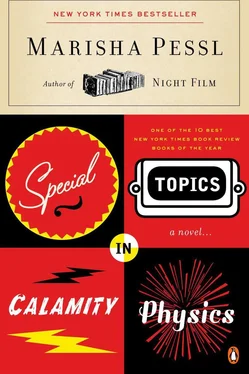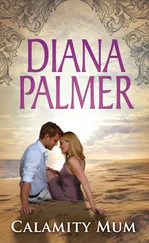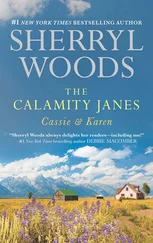Sergeant Harper took my silence for grudging acknowledgment. “She tried it once before, too,” she went on. “The exact same way. Electrical extension cord. Right in the woods.”
I stared at her. “When?”
“Just before she left the home. When she was eighteen. Almost died.”
Harper leaned forward so her big face hovered six inches from mine. “Now” —she leaned in another inch, her voice raspy—“I’ve told you more than enough. And you got to listen. Time and again, I’ve seen innocent people get ruined by these things. And it’s no good. Because it’s not them that did it. It’s between that person and God. So you got to go home, get on with life, not think about it. She was your friend and you want to help her. But I’ll tell you, plain as day, she planned it all along. And she wanted the six of you there for it. You understand me?”
“Yes.”
“Someone who would do that to innocent children isn’t worth getting worked up over, understand?”
I nodded.
“Good.” She cleared her throat, picked up Hannah’s file and slid it into the filing cabinet.
A minute later, Dad and I were walking to the car. Heavy sun drooped over Main Street, made it a compost heap of mushy shadows falling off the hot cars hunched along the curb, and the spindly parking signs, and the bicycle dead on its side, chained to a bench.
“Everything’s fine now, I trust?” he asked merrily. “Case closed?”
“I don’t know.”
“How did Big Red treat you?”
“She was nice.”
“You two seemed to have a rather tantalizing conversation.”
I shrugged.
“You know, I don’t think I’ve ever seen a woman so obscenely orange in all my life. You suppose her hair naturally sprouts from her head that precise shade of carrots, or do you think it’s a special kind of peroxide rinse one buys in the hope that it will temporarily blind people? A deliberate police weapon for her to use against the dissolute and depraved.”
He was trying to make me laugh, but I only shaded my eyes and waited for him to unlock the car.
Hannah’s Memorial Service, held the following Friday, April 16, was a sham. It was a Gallwanian ceremony, so naturally there was no coffin. On Tuesday, when Havermeyer announced the date of the service (also that we were free from class afterward, a Hannah Holiday), he further clarified in a voice with the unmistakable tone of an Epilogue or Afterword, that Hannah had been buried in New Jersey. (It was a dismal prospect. I’d never even heard Hannah say New Jersey. )
And so it was only us that day, the students, the faculty dressed in earth tones, the St. Gallway Choral Society (seventeen humdrum kids who’d recently tacked the word Society onto the end of their name in order to taste exclusivity) and St. Gallway’s part-time chaplain, who wasn’t Reverend Alfred Johnson, Preacher Johnson or Evangelist Johnson, but the spayed and sanitized Mr. Johnson. Supposedly he’d gone to divinity school, but “as what” nobody knew. He was a minister of indeterminate denomination, a truth Headmaster Havermeyer forbade him to disclose or even indirectly allude to during his Friday morning service, in order to avoid offending the one kid whose parents were Latter-Day Saints (Cadence Bosco). In the St. Gallway Admissions Catalogue, Higher Learning, Higher Grounds , the two-story stone chapel was described as a “sanctuary,” technically unaffiliated with a particular religion (though during the holiday season, there were “secular tidings”). It was simply a “house of faith.” Exactly which faith was anybody’s guess. I doubt even Mr. Johnson knew. Mr. Johnson didn’t wear a vicar’s collar but khakis and short-sleeve polo shirts in forest green and royal blue, giving him the air of a golf caddy. And when he talked about a Higher Power, he used words like gratifying, restorative and life-changing. It was something that “got you through the tough times,” which “any young person could manage with a little hard work, trust and tenacity.” God was a trip to Cancun.
I sat with the seniors, second pew from the front, staring down at the play I’d brought with me, A Moon for the Misbegotten (O’Neill, 1943) in order to avoid any eye contact with the Bluebloods. Apart from Jade and Nigel (whose mother had dropped him off one morning directly in front of the Volvo — which I stalled leaving by unzipping and zipping my backpack until he disappeared inside Hanover), I hadn’t seen the others a single time.
I’d heard tidbits of rumor: “I can’t remember what I ever saw in Milton,” said Macon Campins in AP English. “I was next to him in Biology and he totally doesn’t look hot anymore.” “Joalie broke up with him for that very reason,” said Engella Grand. During Morning Announcements and lunch (occasions when I hoped to sneak a speedy look at one of them the way Dad and I had peeked inside the trailer of the world’s smallest she-male at the Screamfest Fantasy Circus) they were nowhere to be found. I could only assume their parents had made some sort of arrangement with Mr. Butters and all five of them were attending rigorous morning and afternoon counseling sessions with Deb Cromwell. Deb, a short, yellow-complexioned woman, slow in movement and fatty in word (a walking wedge of Camembert), had made herself right at home in Hanover Room 109, erecting a variety of posters and cardboard displays. On my way to AP Calculus, as I darted past her room, I noticed, unless Mirtha Grazeley had wandered in (probably by accident, they said she often confused other rooms in Hanover with her office, including the Men’s Room), Deb was always sitting in there alone, keeping herself occupied by paging through her own Depression pamphlets.
Now, behind us on the balcony, the Choral Society started to sing, “All Glory, laud, and honor,” and the Bluebloods were still missing. I was just starting to presume, yet again, they were marooned in Deb Cromwell’s office, Deb turning them on to the pleasures of Self-Acceptance and Letting Go, when Deb herself, a smile gooped onto her face, hastened into the chapel with Ms. Jarvis, the school nurse, lumping herself onto the end of a pew where Havermeyer was sitting with his wife, Gloria, so massively pregnant she looked like she’d been pinned to the ground by a boulder.
Then, I heard someone gasp — it was Donnamara Chase sitting behind me; she needed smelling salts — and most of the school, including a few teachers, swiveled around to watch the five of them saunter in, single file and self-loving (see Abbey Road , The Beatles, 1969). They were head to toe in black. Milton and Nigel looked like ninjas (one XS, the other XL), Leulah, in a long-skirted, high-necked chiffon number, looked vaguely vampiric. Jade was blatantly ripping off Jackie at Arlington (saucer-sized sunglasses on her head and a vintage black alligator handbag were stand-ins for the veil and John-John). Charles was the charred elephant bringing up the rear. He was in black, too, but the giant plaster cast on his left leg (ankle to upper thigh) jutted out like a giant ivory tusk. As he limped along with his crutches, glowering at the floor, disturbingly pasty and thin, his face wet with sweat (gold hair stuck in O s along his forehead like soggy Cheerios in a bowl), I felt sick — not because I wasn’t with them or dressed in black (I hadn’t thought about my outfit; I’d put on a stupid short floral thing), but because he looked so unlike that first time I’d seen him, when he tapped my shoulder during Morning Announcements back in the fall. He was a different person. If once he’d been a Goodnight Moon (Brown, 1947), now he was a Where the Wild Things Are (Sendak, 1963).
Читать дальше












